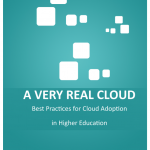The report A very real cloud, published earlier this year, contained a number of interviews and case studies to support and further elaborate on the study itself. Even though the study was focused on the situation within French higher education the interviews and case studies took a wider stance. In this first post we take a look at the situation in British Universities.
Three questions for Peter Tinson, Executive Director of UCISA (Universities and Colleges Information Systems Association) on the use of cloud solutions in British universities.
How is the cloud used for email?
Many universities use Office 365 or Google Apps for email as well as applications and data storage for students and staff. However, some universities use pay ISPs for staff email, or at least solutions that are differentiated from those for students. This also applies to administrative applications like SAP or LMSs likes Moodle or Blackboard.
How are universities outsourcing their data?
Some universities rely on outside companies for their data center. One of the first to do so was City University (London), which moved its data center to a commercial operator in 2002. Others followed. Most of these universities are based in London, where they had difficulties with maintaining data centers because the power supply can fluctuate. These are experiences of renting storage space in commercial data centers. About four years ago, Loughborough University embarked on a hybrid cloud model, in which the infrastructure was hosted within the university while the applications were stored by a private operator that provided flexible storage space as needed.
What existing projects are there in terms of IT resource pooling?
There is a data center project in northeast Scotland, shared between two universities and a faculty. Another project is being set up in London. It will involve four universities and two IT research centers. Other facilities shared between several institutions are set to emerge in the coming months across the UK.













